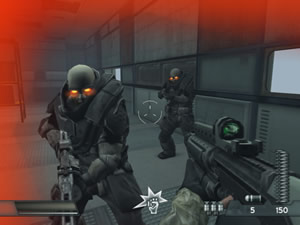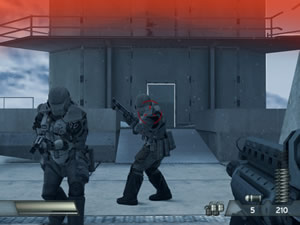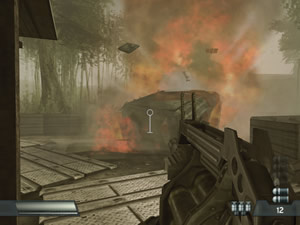Taking as much heat as it packs.
With first-person shooters like Halo 2 and Metroid
Prime 2: Echoes unleashed
for competing systems, PS2 owners have been waiting for a promising game like
Killzone to come along and fight the good fight. Unfortunately,
they are going to have to take a patience pill, because despite a couple of novelties,
Killzone shoots itself in the foot and hops into the trench of mediocrity.
In the future, a vast exodus of humans is forced from Earth to colonize a distant planet with an atmosphere that eventually mutates them into a derivative race, the Helghast. The mutants eventually rebuild their nation into a force strong enough to attack the humans in a bid to reclaim their lost pride. Such is the world according to Killzone.
Despite
this intriguing foundation, Killzone does not expand on the
Helghast nation or culture. Instead, it focuses more on the progression of the
relatively thin war and the narrow relationships between the four playable characters.
Rico is the well-armored tank with a whale of a gun; Hakha is a Helghast and
can pass safely through certain Helghast strongholds; Luger has thermal vision
and can stealthily slip into corridors and tunnels, and Captain Templar is your
all-around butt-kicking warrior.
Each character plays differently enough from the others and they’re all pretty
fun to use. Since you can pick between them before a level begins, you’ll
be able to switch up the gameplay experience to keep things fresh. Additionally,
some missions fork and present you with unique challenges through Killzone‘s
objective-driven gameplay.
Hopes for a highly replayable experience are dashed about twenty minutes in, however, and you’ll be wondering whether you would even want to play through the campaign again due to a slew of annoyingly basic implementation issues that plague Killzone like a militant case of chicken pox.
For one thing, ally and enemy A.I. is terribly unbalanced. A wave of Helghast
will be completely obliterated by your brothers-in-arms with little to no help
required from you, and then about three minutes later, if the baddie is further
than twenty paces away, your fellow troopers will fire one magazine after another
without scoring a single hit. That is, if they successfully stop aiming their
rifles at the walls whenever you are in an enclosed area. To compensate for
their lack of intelligence, ally soldiers are impervious to damage, though
friendly and enemy fire alike triggers a blood splatter animation when bullets
meet skin. Having a troop of invincible grunts on your side might sound pretty
cool, but this Zombie Squad strips any sense of urgency from the
combat.
 The bad guys fare no better. If you’re ducked behind an obstacle with a Helghast right on the other side, it will take a couple of clips before he realizes that his bullets are not hurting the wall. In a brave show of idiocy, he’ll rush around the bunker instead of calling for backup or tossing a grenade.
The bad guys fare no better. If you’re ducked behind an obstacle with a Helghast right on the other side, it will take a couple of clips before he realizes that his bullets are not hurting the wall. In a brave show of idiocy, he’ll rush around the bunker instead of calling for backup or tossing a grenade.
Obviously, this kind of behavior does little to heighten the difficulty level.
Instead, difficulty is achieved by cheesier means, such as the enemy shrugging
off a load of bullets to the body or legs. Add that to the fact that enemies
are as accurate at one hundred paces away as they are at ten, regardless of
the weapon they are using, and you get a game more unfair than rewarding.
Killzone racks up some serious style-points with its techno-industrial
meets WWII motif, while its well-rendered backdrops, characters, and atmospheric
elements make it one of the prettier PS2 titles out there. Once this Colossus
is given speed, however, its Achilles’ heel is exposed: low character framerate.
Not only are the animations awkward, but the heavy effect this has on your
firing accuracy brings Killzone down a full notch. Five out
of ten bullets hitting an enemy when he is fully in your cursor makes the game
feel like a beta and reminds you how shoddy Killzone‘s available
weapon set is, which includes your straightforward shotgun, sniper rifle, rocket
launcher, etc. It is hard to believe that civilization has advanced enough
to colonize space without inventing some equally futuristic munitions.
Though Killzone stumbles in its single player campaign, it manages
to roll out of it and trip a bit more gracefully in its multiplayer. The modes
of play are nothing we have not seen elsewhere. In addition to Deathmatch and
Team Deathmatch, you’ll enjoy the standard fare of Assault, Domination, and “Supply
Drop,” which is Killzone‘s version of Capture the Flag. The
low character framerate difficulties persist and naturally the same arcane weaponry
is present, but aside from that, there is barely any lag time and the environments
carry a smooth framerate when fully loaded with 16 players
While the multiplayer extends the game a bit, Killzone lacks the strategic depth potential and online lasting power offered by games like SOCOM
2: Navy Seals and plays much like any other fragfest you’ve murdered to death before. The maps are varied but not particularly well designed; with only a few hideaways per map, you’ll catch the gist of them relatively quickly.
 Two of Killzone‘s finer points are based on its graphics engine. The camera shifts frantically upon reloading and gives a cool view of the heat you’re packing, a feature that adds a lot of realism and suspense. The same camera shifts are nicely delivered in the occasional melee strike, giving you a wow-I’m-there viewpoint on an enemy getting grilled with the butt of your rifle. Another nifty bonus is that dashing causes the perimeter of the screen to blur ever so slightly and delivers an effective sense of speed. Slick touches.
Two of Killzone‘s finer points are based on its graphics engine. The camera shifts frantically upon reloading and gives a cool view of the heat you’re packing, a feature that adds a lot of realism and suspense. The same camera shifts are nicely delivered in the occasional melee strike, giving you a wow-I’m-there viewpoint on an enemy getting grilled with the butt of your rifle. Another nifty bonus is that dashing causes the perimeter of the screen to blur ever so slightly and delivers an effective sense of speed. Slick touches.
Killzone sets the general mood well with the sounds of crackling grit and falling sand tastefully dappling the musical score. Your squad members’ shouts are as well acted as they are repetitive. “I’m taking heavy fire!” is meaningless from the start since the yeller is invincible, which makes hearing it a thousand times that much more unbearable. Just a gauntlet of repetitive shouts and moans from the Helghast will give you gray hairs’provided you don’t pull them out first.
Small innovations such as the camera jostle and dash screen blur would normally
indicate a developer’s attention to detail, but a slew of minor frustrations
add up to make Killzone a cardiac in a jewel case. It leaves
one to wonder how rushed the final product must have been to land in the maelstrom
of powerful first-person shooters, any one of which would blow the unfinished Killzone to
kingdom come.
-
Interesting backstory
-
Realistic camera motion
-
/ - Basic, linear shooter
-
Graphical bugs
-
Spotty A.I.







